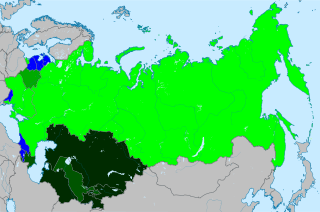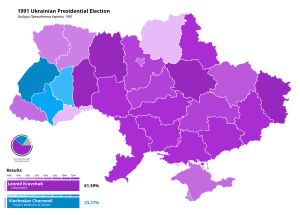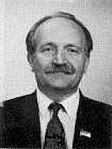
Elections in Venezuela are held at a national level for the President of Venezuela as head of state and head of government, and for a unicameral legislature. The President of Venezuela is elected for a six-year term by direct election plurality voting, and is eligible for re-election. The National Assembly (Asamblea Nacional) has 165 members (diputados), elected for five-year terms using a mixed-member majoritarian representation system. Elections also take place at state level and local level.

Leonid Makarovych Kravchuk was a Ukrainian politician and the first president of Ukraine, serving from 5 December 1991 until 19 July 1994. In 1992, he signed the Lisbon Protocol, undertaking to give up Ukraine's nuclear arsenal. He was also the Chairman of the Verkhovna Rada and a People's Deputy of Ukraine serving in the Social Democratic Party of Ukraine (united) faction.

Elections in Ukraine are held to choose the president, Verkhovna Rada (legislature), and local governments. Referendums may be held on special occasions. Ukraine has a multi-party system, with numerous parties in which often not a single party has a chance of gaining power alone, and parties must work with each other to form coalition governments.

Bulgaria elects on the national level a head of state—the president—and a legislature. The president is elected for a five-year term directly by the people. The National Assembly has 240 members elected for a four-year term by proportional representation in multi-seat constituencies with a 4% threshold. Bulgaria has a multi-party system in which often no one party has a chance of gaining power alone and parties must work with each to form governments.

The People's Movement of Ukraine is a Ukrainian political party and the first opposition party in Soviet Ukraine. Often it is simply referred to as the Movement. The party under the name Rukh was an observer member of the European People's Party (EPP) until 2013. It is considered to have played a key role in Ukraine regaining its independence in 1991.

Early presidential elections were held in Ukraine on 26 June 1994, with a second round on 10 July. They were held ahead of schedule following a compromise between President Leonid Kravchuk and the Verkhovna Rada. The elections saw Kravchuk defeated by his former Prime Minister Leonid Kuchma. They were the first presidential elections in the Commonwealth of Independent States in which the incumbent was defeated.

A referendum on the Act of Declaration of Independence was held in Ukraine on 1 December 1991. An overwhelming majority of 93% of voters approved the declaration of independence made by the Verkhovna Rada on 24 August 1991. Voters were asked "Do you support the Act of Declaration of Independence of Ukraine?" The text of the Declaration was included as a preamble to the question. The referendum was called by the Parliament of Ukraine to confirm the Act of Independence, which was adopted by the Parliament on 24 August 1991. Citizens of Ukraine expressed overwhelming support for independence. In the referendum, 31,891,742 registered voters took part, and among them 28,804,071 voted "Yes".

The Act of Declaration of Independence of Ukraine was adopted by the Supreme Soviet of the Ukrainian SSR on 24 August 1991.

A referendum on the method of the election of the president was held in France on 28 October 1962. The question was whether to have the President of the French Republic elected by direct popular vote, rather than by an electoral college. It was approved by 62.3% of voters with a 77.0% turnout. The reform was controversial because it strengthened the executive at the expense of Parliament, and because of the disputed constitutionality of the procedure used.

Supreme Soviet elections were held in the Ukrainian SSR on 4 March 1990, with runoffs in some seats held between 10 and 18 March. The elections were held to elect deputies to the republic's parliament, the Verkhovna Rada. Simultaneously, elections of oblast councils also took place in their respective administrative divisions.

A referendum on creating the post of President of Russia was held in the Russian Soviet Federative Socialist Republic on 17 March 1991. The referendum was held alongside a referendum of the preservation of USSR. Prior to the referendum, the Russian head of state was the Chairman of the Supreme Soviet of the Russian SFSR, elected by the Congress of People's Deputies of the Russian SFSR. With 71.4% of voters approving the proposal, the post of President of the Russian SFSR was introduced, and two months later Boris Yeltsin was elected as the first president.

The President of Ukraine is the head of state of Ukraine. The president represents the nation in international relations, administers the foreign political activity of the state, conducts negotiations and concludes international treaties. The president is directly elected by the citizens of Ukraine for a five-year term of office, limited to two terms consecutively.

A referendum on the future of the Soviet Union was held on 17 March 1991 across the Soviet Union. It was the only national referendum in the history of the Soviet Union, although it was boycotted by authorities in six of the fifteen Soviet republics.

General elections were held in Zambia on 5 December 1973. They were the first elections held since the country was formally declared a one-party state in August, with the United National Independence Party (UNIP) as the only legally permitted party. UNIP leader Kenneth Kaunda was automatically elected to a third five-year term as President, and was confirmed in office via a referendum in which 88.8% of voters approved his candidacy. UNIP also won all 125 seats in the National Assembly. Voter turnout was 39% of the 1,746,107 registered voters for the presidential election, and 33% for the National Assembly election.

Gert Weisskirchen is a German politician.

An independence referendum was held in the Armenia SSR on 21 September 1991 to determine whether to secede from the Soviet Union. It followed a declaration of independence on 23 August 1990. 99.5% of voters voted in favour, with a turnout of 95%. The country officially became an independent state on 23 September 1991.

An independence referendum was held in Lithuania on 9 February 1991, eleven months after independence from the Soviet Union had been declared on 11 March 1990. Just over 93% of those voting voted in favour of independence, while the number of eligible voters voting "yes" was 76.5%, far exceeding the threshold of 50%. Independence was subsequently achieved in August 1991. The independence of the Republic of Lithuania was re-recognized by the United States on 2 September 1991 and by the Soviet Union on 6 September 1991.
Constitutional Assembly elections were held in Colombia on 9 December 1990 alongside a referendum on the Assembly itself. The Assembly sat from February to July 1991 and drew up the 1991 constitution.
A referendum is a direct vote in which an entire electorate is asked to either accept or reject a particular proposal. This article summarises referendum laws and practice in various countries.

A sovereignty referendum was held in the Ukrainian SSR on 17 March 1991 as part of a USSR-wide referendum. Voters were asked two questions on reforming the Soviet Union into a confederation of sovereign states. Most voters supported the proposal, although in the pro-independence oblasts of Ivano-Frankivsk, Lviv and Ternopil, voters opted for independence as part of an additional question.




















